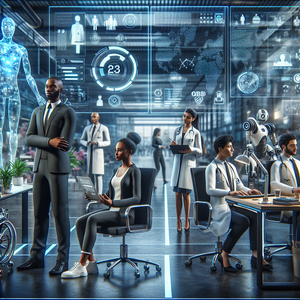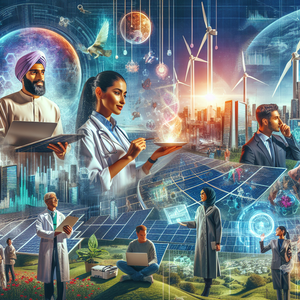
Future-Ready Careers: Exploring New Job Roles and In-Demand Skills
As we move further into the digital age, the job market is undergoing significant changes, driven by technological progress and shifting societal needs. This shift invites us to explore the "jobs of the future," highlighting new roles that are reshaping the workforce and the skills needed to excel in them. Drawing from reliable sources, industry reports, and expert opinions, this article examines opportunities in fields such as technology, healthcare, renewable energy, and human resources. For example, AI and Machine Learning Specialists are not only leading technological progress but also influencing industries from automotive to marketing. Meanwhile, roles like Biometric Technicians and Digital Transformation Specialists meet the growing demand for expertise in advanced technologies. These diverse job opportunities emphasize the importance of technical skills in roles like Data Scientists and the essential service skills seen in Healthcare Professionals. These trends highlight the integration of both hard and soft skills and the growing focus on sustainability and ethical business practices. Ultimately, the future of work calls for adaptability and lifelong learning alongside technological skills. This article serves as a comprehensive guide to emerging job roles, detailing the tasks, requirements, and contributions each makes to the changing job market.
Job Summaries:
AI and Machine Learning Specialist:
- AI and Machine Learning Specialists are key players in developing algorithms and models that enable computers to learn and make decisions independently.
- Their work spans creating self-driving cars to designing tailored marketing solutions.
- Job growth projected to rise by 15% over the next decade.
- A solid background in computer science, mathematics, and statistics is essential.
- Skills in programming languages like Python and R are required.
- Ability to analyze data and turn complex datasets into useful information is crucial.
- These specialists are central to driving progress and efficiency across industries.
Big Data Analyst:
- Big Data Analysts interpret large sets of data to uncover patterns that guide strategic business decisions.
- By working with data scientists and business teams, they transform raw data into valuable reports and visualizations.
- Key skills include data mining, statistical analysis, and familiarity with tools such as SQL and Hadoop.
- With an expected job growth of 22%, a background in mathematics, computer science, or a related field is necessary.
- Emphasizing the role's importance as organizations adopt data-driven strategies to boost competitiveness and efficiency.
Digital Transformation Specialist:
- Digital Transformation Specialists guide organizations in adopting digital technologies to improve business processes.
- They assess current operations, identify areas for improvement, and implement solutions like automation and cloud computing.
- With a projected job growth rate of 20%, strong project management skills, IT systems knowledge, and a deep understanding of business operations are vital.
- These specialists ensure companies remain competitive and flexible in an increasingly digital world, adapting to new market realities and customer expectations.
Biometric Technician:
- Biometric Technicians play a crucial role in installing and maintaining biometric systems used for security and identification, such as fingerprint, facial recognition, and retina scanning technologies.
- Technical expertise in electronics and computer systems, along with problem-solving skills, is critical.
- As security concerns grow and job opportunities expand by 18%, a degree in information technology or a related field is often required, highlighting the vital role these technicians play in securely implementing biometric technologies.
Healthcare Data Analyst:
- Healthcare Data Analysts focus on analyzing medical data to enhance patient care and operational efficiency in healthcare facilities.
- They use electronic health records to identify trends and areas for improvement, requiring skills in data analysis, statistics, and healthcare informatics, along with knowledge of healthcare regulations.
- With an expected job growth of 23%, these analysts are key players in improving patient outcomes and regulatory compliance as data-driven care becomes more central to healthcare delivery.
Sustainability Specialist:
- Sustainability Specialists develop strategies to help organizations operate sustainably, aiming to reduce their environmental impact.
- Conducting assessments, implementing initiatives, and tracking progress towards environmental goals, they require knowledge of environmental science, project management, and regulatory compliance.
- As businesses prioritize sustainability with job growth at 16%, these specialists guide organizations towards environmentally responsible practices while maintaining profitability.
Cybersecurity Analyst:
- Cybersecurity Analysts protect organizations from cyber threats by monitoring networks, investigating security breaches, and developing security protocols.
- With a projected job growth of 31%, proficiency in network security, ethical hacking, and knowledge of security standards are essential.
- A degree in computer science or cybersecurity is typically required, as these analysts are crucial in safeguarding sensitive data and maintaining digital trust amid increasingly sophisticated cyber threats.
Human-Machine Interaction Designer:
- Human-Machine Interaction Designers create user interfaces that facilitate smooth interaction between humans and machines.
- Focusing on user experience design to ensure technology is intuitive and accessible, they require skills in design software, user research, and understanding human psychology.
- As technology integrates further into daily life and job growth reaches 19%, these designers play a crucial role in enhancing user experience.
Blockchain Engineer:
- Blockchain Engineers develop and implement blockchain solutions for secure, decentralized transactions.
- They design protocols, build networks, and ensure transaction integrity.
- They need programming skills in languages like Solidity and Java, along with blockchain technology expertise.
- As blockchain applications expand beyond cryptocurrencies and job opportunities grow by 21%, these engineers are key in leveraging blockchain’s potential for enhanced security and transparency.
Virtual Reality Developer:
- Virtual Reality Developers create immersive digital experiences using VR technology.
- Designing applications for entertainment, education, and training.
- Skills in 3D modeling, computer graphics, and programming languages such as C++ and Unity are essential.
- With VR gaining popularity and job growth projected at 24%, these developers are at the forefront of creating engaging and educational applications.
Renewable Energy Technician:
- Renewable Energy Technicians install and maintain systems generating energy from renewable sources like wind, solar, and hydro.
- Ensuring systems operate efficiently and troubleshooting issues, they require technical skills in electrical systems, knowledge of renewable technologies, and physical stamina.
- As the world shifts towards sustainable energy with job growth at 25%, these technicians are crucial in ensuring reliable renewable energy systems.
Augmented Reality Specialist:
- Augmented Reality Specialists develop applications that overlay digital information on the physical world, enhancing user experience in sectors like retail, education, and healthcare.
- Skills in 3D modeling, user interface design, and software development are needed, as these specialists transform user interaction with their environment.
- With job growth expected at 20%, they play a pivotal role as AR technology becomes widespread.
Genetic Counselor:
- Genetic Counselors assess risk for inherited conditions and guide patients through genetic testing and results interpretation.
- A master’s degree in genetic counseling and certification are required.
- With genetic testing becoming more accessible and job growth at 27%, these counselors help individuals understand their genetic health and make informed decisions.
Climate Change Analyst:
- Climate Change Analysts study climate data to develop strategies for minimizing adverse effects.
- They work with governments and organizations to implement sustainable practices.
- Skills in environmental science, data analysis, and policy understanding are crucial.
- Climate change remains a pressing issue with job growth at 19%.
- These analysts guide efforts to reduce emissions and promote sustainability.
Telemedicine Specialist:
- Telemedicine Specialists implement telehealth systems, ensuring technology is effective and user-friendly.
- Skills in healthcare IT, systems analysis, and customer support are important.
- With the rise of remote healthcare solutions and job growth at 28%, these specialists expand access to medical care and improve delivery efficiency.
In summary, the future job market will blend technical expertise with soft skills, placing a growing emphasis on sustainability and ethical practices. Preparing for these emerging roles requires a commitment to adaptability and lifelong learning. By understanding the requirements and contributions of each role, individuals can better steer their career paths in an ever-changing job landscape. As new opportunities continue to emerge, it's essential to stay informed, embrace continuous learning, and be ready to adjust to the dynamic world of work.
Explore More Jobs

